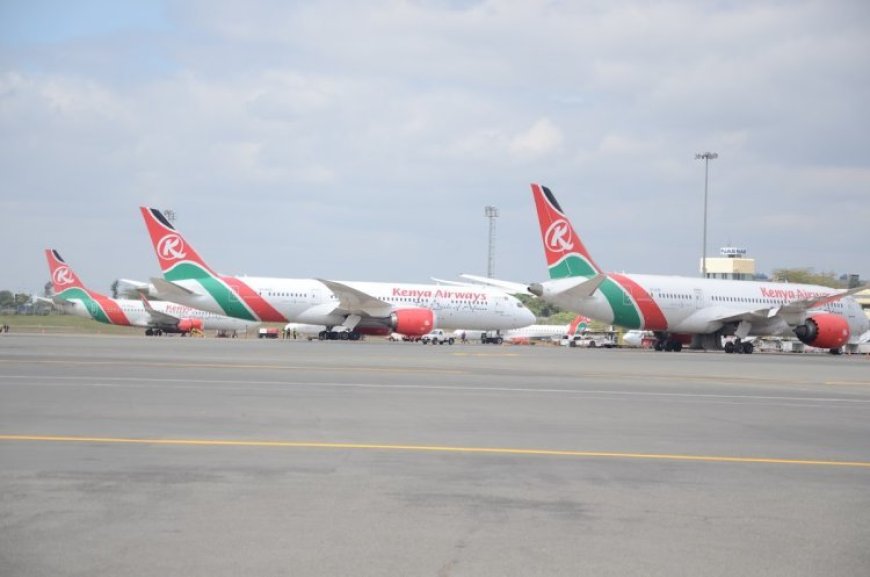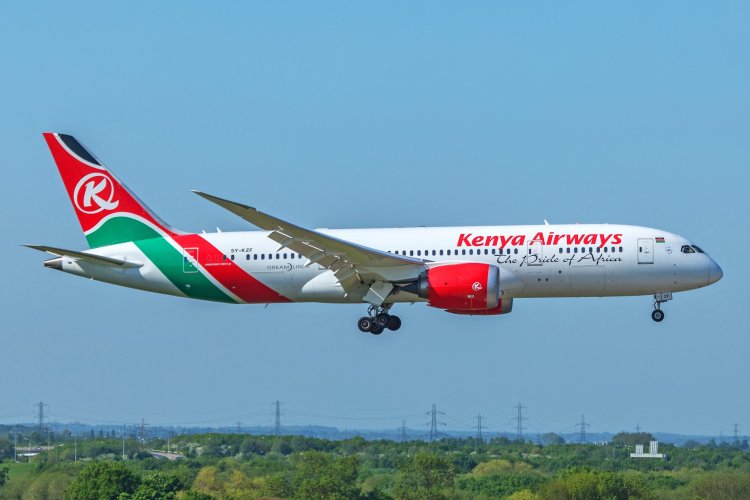Govt Could Lose Majority Shares In Kenya Airways; Here's Why
The deal could however see the national government lose its majority stake of 48 per cent should the new investor buy out all the shares offered by the airline

The national government looks likely to lose the 49 per cent shares it wields in national carrier, Kenya Airways if a deal in the works with an equity investor is anything to go by.
Speaking to Citizen TV on Friday, April 12, Kenya Airways Chief Executive Officer (CEO) Allan Kilavuka revealed that numerous investors have expressed interest in the airline, which is expressing optimism in sealing a deal with the investor before the end of the year.
The deal could however see the national government lose its majority stake of 48 per cent should the new investor buy out all the shares offered by the airline in the recapitalisation deal aimed at returning the renowned airline to profitability.

Transport CS Kipchumba Murkomen with Kenya Airways CEO, Allan Kilavuka during a meeting at Kenya Airways Headquarters on March 7, 2023. /KIPCHUMBA MURKOMEN
“We’re looking for an equity investor that can invest up to a maximum of 49 per cent...that’s the maximum.
"The reason that the maximum is because the rules in Kenya don’t allow you to have an AOC (Air Operator Certificate) or an airline operating certificate if you have more than 50 per cent foreign ownership,” said Kilavuka.
An AOC, sometimes alternatively described as an Air Operator Permit, is the approval granted by a national aviation authority to an aircraft operator to allow it to use aircraft for commercial purposes.
This requires the operator to have personnel, assets and systems in place to ensure the safety of its employees and the general public. This document will as a minimum detail the aircraft types which may be used, for what purpose and in what geographic region.
Kilavuka further noted that the airline anticipates that the investor will be foreign, therefore necessitating the cap at 49 per cent to ensure business continuity.
The move will mean that the new investor automatically becomes the majority shareholder, placing the government at risk of losing the majority ownership it has enjoyed throughout the years of the airline.
The national government is the majority shareholder with a 48.90 per cent stake, followed by KQ Lenders Company 2017 Limited at 38.09 per cent and Dutch airline KLM at 7.76 per cent.
Other shareholders include Kenya Airways employees at 2.44 per cent, while the remaining shares are spread across other seven shareholders.
“It's not a one-fits-all; some will want more involvement, others will want less involvement. For us, the ideal investor would be one that, of course, gives us the financial support we are looking for the capitalization we're looking for...one that would add value particularly technically, and complement our core business,” Kilavuka further noted.
To move the airline into the future, the CEO noted that capital injection will help KQ strengthen its balance sheet through capital restructuring, ensure that the airline has adequate working capital for quick investment as well as ensure the airline expands and modernises to remain competitive.
On Tuesday, March 26, KQ posted an operating profit of Ksh10.5 billion for the first time since 2017 for the year ended December 31, 2023, a turn-around from an operating loss of Ksh5.6 billion in 2022, a 287% growth.
Earlier this year, the National Treasury cleared more than half of Kenya Airways’ guaranteed debt with a fresh Ksh6.9 billion payment in the quarter that ended in December, meaning that the government exchequer offset Ksh53.7 billion out of a Ksh69.9 billion KQ debt it took over last year as part of a wider strategy to restructure the operations of the national carrier.

A Kenya Airways plane landing at an airport. /FILE






